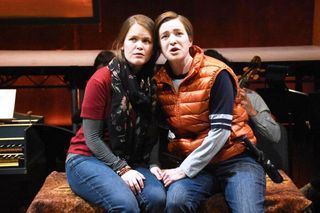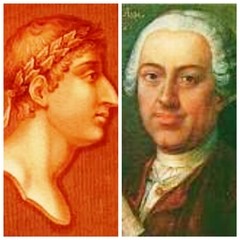|
Back
Star-Crossed Lovers on a Generation-Crossed Stage New York
Baruch Performing Arts Center
03/22/2018 - & March 23, 24, 25, 2018
Josef Adolf Hasse: Piramo e Tisbe (New York Premiere)
Kristin Gornstein*/Sarah Nelson Craft (Piramo), Kelly Curtin*/Summer Hassan (Tisbe), Brian Downen*/Glenn Seven Allen (Padres), Giovanni Da Silva, Hunter Hoffman (Suitor, Soldier)
New Vintage Baroque, Elliot Figg (Harpsichord, Conductor)
Philip Schneidman (Director), Neil Patel and Cate McCrea (Set Designers), Lara De Brujin (Costume Designers), Grant Yeager (Lighting Design), Alex Basco Koch (Projection Design), Catherine Miller (Associate Music Director), Robert Airhart (Production Manager), Giles T. Horne (Production Stage Manager), Brad Lemons (Fight Director), Jessica Fleischmann (Assistant Stage Manager), John Erickson (Projection Designer)

K. Curtin, K. Gornstein (© Tina Buckman)
“Vivam” (“I shall live”)
The last word in Metamorphosis by Publius Ovidius Naso (Ovid) (43 B.C.E.-18 CE)
Audiences might be surprised that Piramo e Tisbe received its first performance here in 250 years. After all, we well know Shakespeare’s rustic version of Ovid’s story (“Kiss me through the chink in that vile wall!”) and Benjamin Britten’s version of the same Shakespeare in his Midsummer Night’s Dream.
But Ovid beat them all in Metamorphosis, perhaps taking fragments of a mythical story, then changing it to a pre-Romeo and Juliet with is “star-crossed lovers”, feuding families, and mutual suicide by accident.
Johann Adolf Hasse was certainly inspired by the tale. He had left his comfortable position in Dresden, and the popular 18th Century composer wrote this 90-minute “tragic intermezzo” for a noble family, where it was produced in 1768, and rarely produced since then.
The Little Opera Theater of New York production had some serious problems. But musically, the opera premiere last night was a gem. Hasse–like Mozart and Gluck–was far more Italian than German in his operas, and this one sailed along with Arcadian delight. More than aria and recitative, Hasse provided a through-composed opera, where long arias segued into orchestrated recitations, where simple melodies turned into epic-sized scenas.
Even better, like Gluck’s original Orpheus, this was written for two woman (or perhaps in the original for a boy soprano or castrato), so the duets came flowing out in thrilling harmonies. Richard Strauss, also inspired by Ovid, understood this airy delight of two sopranos in love duet, and Hasse made good use of it.
Last night’s Thisbe was Kelly Curtin (she alternates over the next three nights with Summer Hassan), and she was as charming as the music. The arias were for coloratura, with all the ornaments, leaps of notes (did Ms. Curtin reach high D in her forest scene?), and 18th Century vocal acrobatics. Not only did she perform them effortlessly, but in the midst of the note flurry, she retained the theatrical role of the star-struck teenager.
Pyramus was Kristin Gornstein, playing the obsessed teenage boy. She was more the contralto with many a gambol to the top ranges, And her arias in the lower ranges were beautiful. Alas, she did not have the virtuosic confidence of Ms. Curtin, and her Baroque twists and twirls seemed forced, more exercises than the seeming delight of Thisbe.
The third singing role was Glenn Seven Allen, Thisbe’s father, angry, irascible, warning his daughter about marrying Pyramus, and then killing himself upon finding his daughter dead. That was his only major aria, and the tenor was more than adequate.
This with the thin but authentic New Vintage Baroque led from the harpsichord by Elliot Figg, gave a fine musical perfiormance.

Ovid/J. A. Hasse
The major problem could have come from the mixture of ages, but the various anachronisms were beguiling, never upsetting. Like Rembrandt’s Aristotle looking at a bust of Homer, this opera had three or four different eras, separated by a few thousand years. But nothing was discomfiting.
After all, Pyramus probably originated before 1200 B.C.E. Ovid took the few fragments more than a thousand years later for the classical story. Some 14 centuries after that Hasse worked with a librettist, Marco Coltellini, to change the story (the father didn’t die in the original). And some 250 years after that, director Philip Schneidman brought it even more up to date in this production.
The costumes were pure 21st Century Teenage, the kids wearing jeans and sneakers, the adults wearing suits. After that, though, this show had some problems.
One was the set. A modern balsa-looking wall, a bare stage with table on one side, a mess of garbage pails and rubble on the other side of the wall. No “crevasse” but a whole section removed. Already, the intimacy was an illusion.
The stage was dominated by a huge screen from ceiling to floor with nothing on it. What should have been an Arcadian setting (albeit ersatz-Babylonian) became a simple set with a giant white nothingness in the background.
True that screen had some stop-motion pictures in the second act (not a lion, but what seemed like a rabid dog or coyote), and fruit trees. But that seemed a distraction in such an enchanting chamber piece. Add to that a few more distractions, like a Second Act aquarium bowl (supposedly a brook), and the title of the opera in Arabic. (Rather than the Babylonian Akkadian language, which looks even more exotic).
What really destroyed the illusion, though, were military things which are nowhere in Ovid, and I doubt in Hasse’s original opera. First, the father accompanied in the first act by a muscular guard holding a semi-automatic gun. Then, a totally absurd second act beginning as two camouflaged GI’s with guns and flashlights, run through the nighttime sets. And if they are evidently employees of the father, why the hell should they have tried to rape Thisbe just as the wild beast is appearing on the screen??
The near-rape is actual violence in a story which comes nowhere near to that kind of action. The delight of Ovid’s story (and the Hasse opera) is that the lovers were torn apart by Nature, just as their blood turned the mulberries blood-red.
Even with the un-Ovidian coda as the father kills himself, we still must be left with the beauty of the two lovers, the simplicity of the story. And of Ovid’s verse about the death translated by Ted Hughes:
“The gods were listening and were touched. /And the gods touched their parents. Ever after /Mulberries, as they ripen darken purple.”
So one is still left with these beautiful arias, these simple melodies enhanced by Baroque embroidery, here sung by a pair of seeming-adolescents feeling the rapture through their voices.
One leaves this rare theatrical event trying to ignore the military distractions and remembering the melodic creations of composer Hasse.
Harry Rolnick
|